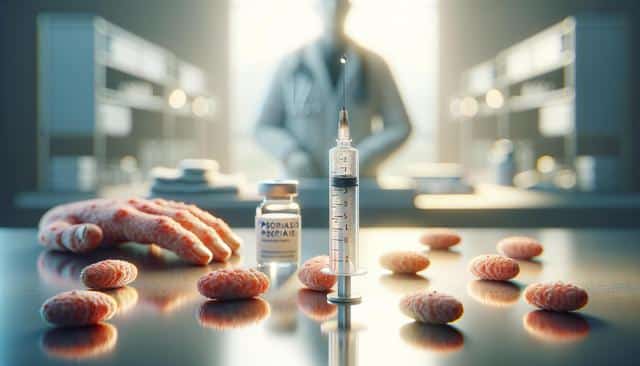Understanding Psoriasis Shots: A Targeted Approach to Treatment
Psoriasis shots, including biologic treatments like Humira or Stelara, help manage severe psoriasis. These injections target specific immune system proteins, reducing inflammation and skin plaques. Consult with your dermatologist to determine if psoriasis shots are right for you.

What Are Psoriasis Shots?
Psoriasis shots, often referred to as biologic injections, are a modern treatment option for individuals with moderate to severe psoriasis. These treatments are typically prescribed when topical treatments and phototherapy have not been effective. Psoriasis is an autoimmune condition, and these injections work by targeting specific parts of the immune system responsible for causing the chronic inflammation that leads to red, scaly patches on the skin. Biologic drugs are generally administered via subcutaneous injection, either by a healthcare provider or self-injection at home, depending on the medication and patient preference.
The introduction of biologic treatments has changed the landscape of psoriasis management. Unlike broad systemic drugs that suppress the immune system entirely, biologics are more selective. They target proteins such as tumor necrosis factor-alpha (TNF-alpha), interleukin-12, interleukin-23, or interleukin-17, which are known to play a central role in the development of psoriasis. This selective targeting often results in fewer side effects and improved outcomes for many patients.
Types of Biologic Injections for Psoriasis
There are several biologic medications approved for the treatment of psoriasis. Each one works slightly differently, and the choice of drug often depends on the patient’s specific symptoms, medical history, and how they have responded to previous treatments. Some common categories of biologics include:
- TNF-alpha inhibitors – target a protein that causes inflammation
- IL-12/23 inhibitors – block interleukins 12 and 23 to reduce immune response
- IL-17 inhibitors – focus on reducing the action of interleukin-17
- IL-23 inhibitors – specifically block interleukin-23 pathways
These treatments are usually given once every few weeks or months. The dosing schedule varies depending on the specific medication and the patient’s needs. Some patients may notice significant improvement within a few weeks, while for others, it may take several months to see noticeable results.
Who Might Benefit from Psoriasis Shots?
Psoriasis shots are not necessary for every person with psoriasis. They are typically recommended for those with more severe or persistent symptoms who have not responded well to topical creams or light therapy. In particular, biologic injections may be suitable for individuals who:
- Have large areas of skin affected
- Experience joint pain associated with psoriatic arthritis
- Have not found relief with conventional treatments
- Are seeking a long-term management strategy
Before starting a biologic, patients usually undergo a thorough medical evaluation. This includes screening for infections, as biologics can affect immune system function. Regular follow-up appointments are also necessary to monitor progress and watch for any potential side effects.
Potential Side Effects and Considerations
While psoriasis shots can be highly effective, they are not without risks. Side effects can vary depending on the specific medication and the individual’s overall health. Common side effects may include:
- Injection site reactions such as redness or swelling
- Increased risk of infections
- Fatigue or flu-like symptoms
- Potential allergic reactions
More serious complications are rare but can include reactivation of certain infections like tuberculosis or hepatitis. For this reason, screenings are essential before starting treatment. Additionally, individuals with certain health conditions, such as multiple sclerosis or certain types of cancer, may not be suitable candidates for biologic therapy.
It’s important to maintain open communication with your healthcare provider throughout the treatment process. Any new or worsening symptoms should be reported promptly to ensure timely management and adjustments as needed.
Making an Informed Decision
Choosing to begin biologic treatment for psoriasis is a significant decision that should be made in consultation with a qualified dermatologist. Factors to consider include the severity of your symptoms, your personal health history, lifestyle, and treatment goals. Many patients who start psoriasis shots find that they can manage their symptoms more effectively and experience an improved quality of life.
The process typically involves an initial consultation, followed by diagnostic tests and discussions about the various biologic options available. Once a suitable treatment is selected, the first injection is usually administered under medical supervision. Patients are then educated on how to self-administer future doses if appropriate.
Financial considerations also play a role, as biologic medications can be costly. However, many pharmaceutical companies and insurance providers offer assistance programs to help manage expenses. Be sure to explore these options during your treatment planning phase.
Conclusion: Is a Psoriasis Shot Right for You?
Psoriasis shots offer an advanced treatment option for those struggling with moderate to severe psoriasis. By targeting specific immune responses, biologics can help reduce inflammation, clear skin plaques, and improve overall comfort. While they are not suitable for everyone, they can make a meaningful difference for those who qualify. If you’re considering this path, a thorough discussion with your dermatologist can help you weigh the benefits and risks, leading to a more informed and effective psoriasis management strategy.